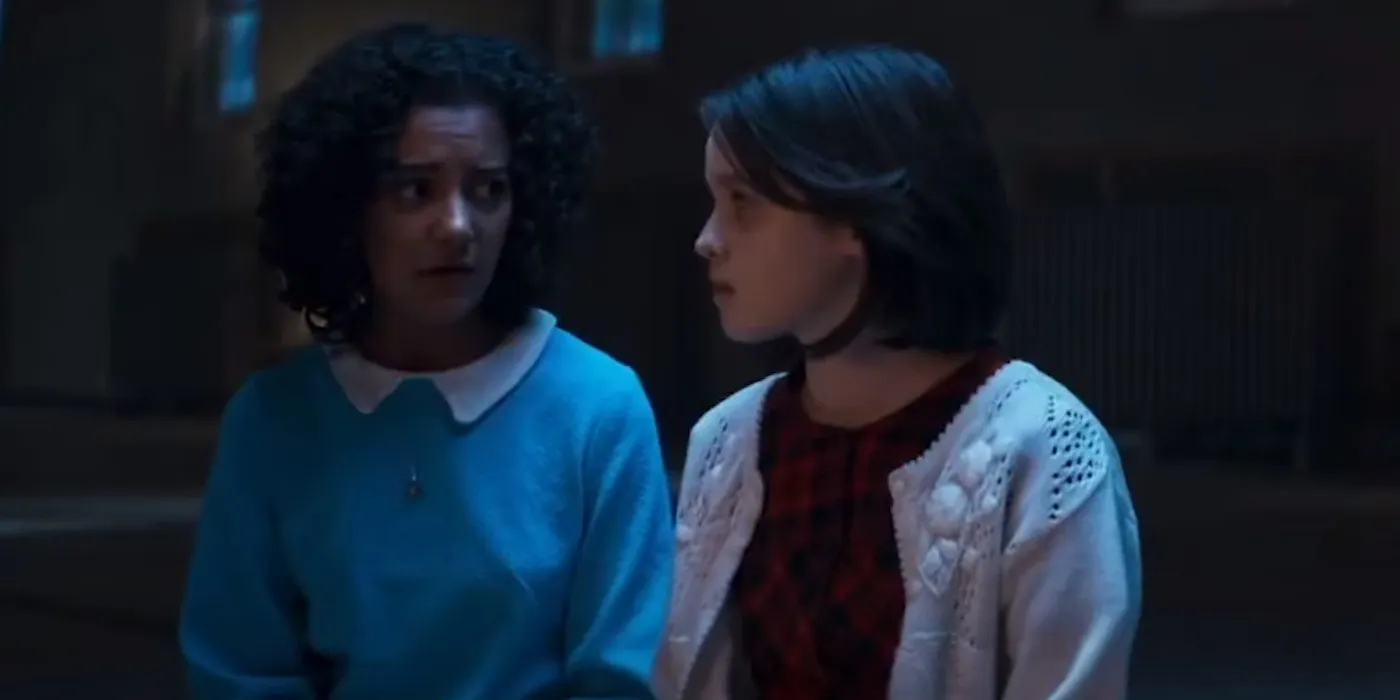In the ever-evolving landscape of cinema, particularly the horror genre, Jenn Wexler’s 2023 film The Sacrifice Game emerges as a compelling narrative that transcends the traditional boundaries of horror and delves into the realms of feminist philosophy, particularly resonating with the ideas of Julia Kristeva.
This brief review/analysis sets out to explore the depths of Wexler’s work, contrasting it with Alexander Payne’s Holdovers (2023) and unravelling its intricate layers of meaning and representation.
Setting the Scene: The Haunting World of Blackvale Catholic School

The Sacrifice Game initially presents itself as a quintessential horror film, set against the eerie backdrop of Blackvale Catholic girls’ boarding school in the winter of 1971. The story orbits around two central characters, Samantha (Madison Baines) and Clara (Georgia Acken), who are students at the school, and their guardians – teacher Rose (Chloë Levine) and her boyfriend Jimmy (Gus Kenworthy).
Shattering Expectations: Discovering the Film’s Unique Blend of Horror and Feminist Philosophy

Anticipating a standard horror plot filled with predictable elements of gore and sudden frights, I braced myself for an enjoyable yet conventional cinematic ride. To my surprise, The Sacrifice Game shattered these expectations, unfolding into a rich mixture of feminist themes and philosophical reflections. This unexpected depth and complexity set the film apart from traditional horror movies, making it a thought-provoking experience.
Jenn Wexler’s Multi-Layered Narrative Approach
Director Jenn Wexler’s approach to filmmaking in The Sacrifice Game is about weaving a multi-layered narrative that resonates emotionally and intellectually with ourselves, its audience. The screenplay, a collaborative effort with Sean Redlitz, masterfully strikes a balance between unexpected plot twists and a well-structured story-world, a challenging achievement in the horror genre.
A Symphony of Emotions: The Film’s Juxtaposition of Horror and Humor
Filmed amidst the stark, snowy landscapes of Canada, the movie navigates through a spectrum of emotions, from bone-chilling horror to absurdist humour. This unique amalgamation of different elements, along with the festive backdrop, crafts a bizarre yet captivating atmosphere that thoroughly engages and intrigues us.
Turning Point: The Arrival of Demonic Cultists and a Shift in Narrative

A critical turning point in the film is the arrival of a group of demonic cultists, led by the enigmatic Maisie (Olivia Scott Welch) and the menacing Jude (Mena Massoud), who invade the school. This dramatic shift in the narrative propels the story from a seemingly ordinary setting into a high-stakes, suspenseful scenario reminiscent of classic home invasion thrillers like The Strangers (2008).
The antagonists, including their accomplices Grant (Derek Johns) and Doug (Laurent Pitre), are portrayed with remarkable depth and a touch of dark humour, adding layers to their characters and elevating the film’s overall narrative complexity.
The latter half of The Sacrifice Game ventures into an almost fantastical realm, blending themes typical of young adult fiction with intense horror elements. Wexler demonstrates remarkable courage and creativity in her direction of young actors, infusing the film with raw, impactful gore that adds a distinct flavour to the horror genre.
The Abject and the Self: Exploring Julia Kristeva’s Influence on Character Development

It is in this part of the film that Julia Kristeva’s (1982) theory of abjection, as discussed in Powers of Horror: An Essay on Abjection, becomes a vital lens for interpretation. Kristeva explores the concept of the ‘abject’ as that which is excluded from the symbolic order, challenging our sense of identity, system, and order. This notion is particularly pertinent in understanding the complex character portrayals in the film, especially that of Clara, played by Georgia Acken.
The Essence of Abjection: Clara’s Pivotal Role and Kristeva’s Psychosexual Theory
Acken’s portrayal of Clara is a testament to the essence of Kristeva’s abjection. Her performance transcends mere plot exposition, instilling a sense of foreboding and dark humour. Acken’s portrayal, particularly in scenes depicting violence and confrontation, is both haunting and mesmerizing, pulsating with a vitality that captivates the audience. Through her character, the film explores the primal boundaries between self and other, delving into themes of maternal separation and repression.

Moreover, The Sacrifice Game aligns with Kristeva’s insights on psychosexual development, where the abject signifies the moment of differentiation from the maternal figure and the recognition of individual and external identities. This concept is intricately woven into the narrative, vividly portraying the journey of identity formation and the confrontation with mortality and corporeality. The film uses horror as a medium to externalize and confront deep-seated fears and societal taboos, particularly those associated with the human body and its functions.
Concluding Thoughts: ‘The Sacrifice Game’ as a Cinematic Journey Beyond Horror
In summary, The Sacrifice Game is a cinematic journey that intertwines feminist philosophy with the visceral elements of horror. It challenges the audience to confront their own identities, societal norms, and the very nature of existence. Wexler, through her unique vision, has created a film that is both a thrilling horror experience and a profound exploration of human psychology and societal constructs. As such, it stands as a testament to the genre’s potential to transcend mere entertainment and engage with deeper, more complex themes.
Bibliography:
Kristeva, J. (1982). Powers of horror: An essay on abjection. Columbia University Press.

